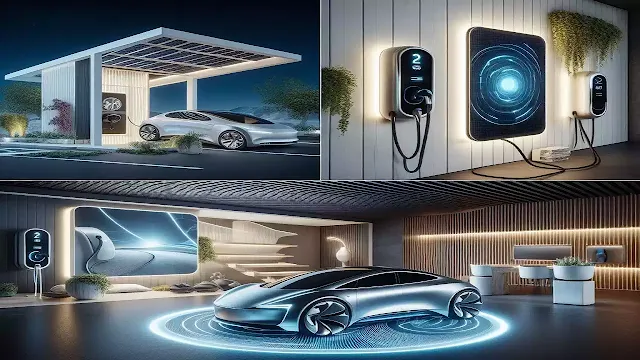7 Powerful Electric Car Charging Solutions to Supercharge Your Lifestyle
Introduction
As the global shift towards sustainability gains momentum, the popularity of electric vehicles (EVs) continues to soar. With this growing trend, homeowners are seeking efficient and innovative solutions to seamlessly incorporate eco-friendly transportation into their lives. This guide aims to delve into seven robust charging solutions tailored specifically for homeowners in 2024. By exploring these options, homeowners can ensure a smooth and effortless transition to electric mobility, aligning with their eco-conscious lifestyle goals.

Electric car charging solutions home 2024
Charge Up Your Lifestyle: Innovative Electric Car Charging Solutions for Homeowners in 2024
The Rise of Electric Vehicles
Revolutionizing the Automotive Industry:
The rise of electric vehicles has sparked a revolution, offering environmentally-conscious consumers a cleaner and greener alternative to traditional gasoline-powered cars.
Advancements in Technology:
Thanks to significant advancements in technology and infrastructure, electric vehicles have evolved from niche options to practical choices for everyday use.
Embracing Electric Mobility:
Homeowners are eagerly embracing electric mobility, seeking out convenient charging solutions to complement their commitment to sustainable living.
Understanding Electric Car Charging Options
To grasp electric car charging fully, it's essential to explore the available options. There are three main categories: Level 1, Level 2, and DC Fast Charging. Here's a breakdown:
Level 1 Charging:
Level 1 charging involves using a standard household outlet to charge an electric vehicle. While convenient due to widespread availability, Level 1 charging typically offers slower charging speeds compared to other options. It is most suitable for situations where overnight charging is feasible, such as at home, or when faster charging is not urgently required.Level 2 Charging:
Level 2 charging requires the installation of a dedicated charging station, usually at home or in public charging areas. These stations offer faster charging times compared to Level 1 chargers, making them ideal for daily use. With Level 2 charging, homeowners can conveniently charge their electric vehicles overnight and ensure a fully charged battery each morning for their daily commute or errands.DC Fast Charging:
DC Fast Charging, also known as Level 3 charging, provides rapid charging at specialized charging stations. These stations are typically located along highways and major travel routes, making them ideal for long-distance travel. While DC Fast Charging offers the fastest charging speeds, it may come with higher costs compared to Level 1 and Level 2 charging options. However, for electric vehicle owners requiring quick replenishment of battery power during long trips, DC Fast Charging provides a convenient solution.
Charge Up Your Home: Residential Charging Stations
Convenient Charging at Home:
Residential charging stations, also referred to as Level 2 chargers, are a favored option for homeowners seeking to charge their electric vehicles conveniently at home.
Faster Charging Times:
Compared to Level 1 chargers, these stations offer quicker charging times, making them well-suited for fulfilling daily charging requirements.
Overnight Charging:
Installing a residential charging station allows homeowners to conveniently charge their EVs overnight, ensuring they begin each day with a fully charged battery.
Smart Charging Solutions for Smart Homes
Seamless Integration:
Smart charging solutions seamlessly integrate with smart home systems, enabling homeowners to manage their EV charging remotely.
Optimized Charging:
These intelligent systems optimize charging schedules based on energy demand and electricity rates, helping homeowners save money while reducing their carbon footprint.
Advanced Features:
Smart charging solutions offer advanced features such as smartphone connectivity and energy usage monitoring, providing homeowners with greater control over their charging experience.
Solar-Powered Charging Stations
Harnessing Solar Energy:
Solar-powered charging stations utilize the sun's energy to charge electric vehicles, providing homeowners with a sustainable and renewable charging solution.
Generating Clean Electricity:
By installing solar panels on their property, homeowners can generate clean electricity to power their EVs, reducing reliance on the grid and lowering energy costs.
Environmental Friendliness:
Solar-powered charging stations are environmentally friendly and offer an excellent long-term investment for homeowners committed to sustainability.
Portable Charging Solutions for Flexibility
Ultimate Flexibility:
Portable charging solutions offer homeowners unparalleled flexibility and convenience, catering to their on-the-go lifestyle.
Charging Anywhere:
EV owners can charge their vehicles wherever there's a power outlet, whether at home, work, or on a road trip, thanks to portable chargers.
Compact and Lightweight:
These chargers are compact and lightweight, making them easy to transport and store in the trunk of the car, ensuring drivers always have a reliable charging option available.
Wireless Charging Technology
Effortless Charging:
Wireless charging technology eliminates the need for cables and plugs, offering homeowners a hassle-free charging experience.
Automatic Charging:
With wireless charging pads installed in parking spaces, EV owners can simply park their vehicles over the pad to initiate charging automatically.
Convenience and Efficiency:
This innovative technology is convenient, efficient, and reduces clutter, making it an attractive option for homeowners looking to streamline their charging process.
Community Charging Networks
Expanded Access:
Community charging networks extend homeowners' access to shared charging infrastructure beyond their individual residences.
Strategic Locations:
These networks boast public charging stations strategically positioned in places like shopping centers and parking lots.
Flexibility and Peace of Mind:
By joining a community charging network, homeowners gain increased flexibility and peace of mind, knowing that charging facilities are easily accessible wherever they go.
Conclusion
As electric vehicles gain momentum worldwide, homeowners now have access to a variety of charging solutions. Installing a residential charging station, like Level 2 chargers, provides faster and convenient charging at home. Solar-powered stations offer eco-friendly charging, reducing reliance on fossil fuels. Wireless charging pads simplify the process, eliminating cables and plugs. These solutions not only promote sustainability but also contribute to reducing carbon emissions. Mortgage holders assume a vital part in molding a greener transportation scene by embracing these creative charging choices.
FAQs
How much does it cost to install a residential charging station?
The cost of installing a residential charging station varies depending on factors such as the charger's brand, installation complexity, and electrical infrastructure. On average, homeowners can expect to pay between $500 to $2,000 for equipment and installation.
Can I charge my electric car using a standard power outlet at home?
While it is possible to charge an electric car using a standard power outlet (Level 1 charging), it is significantly slower compared to Level 2 charging stations. For faster charging times, homeowners are advised to install a dedicated Level 2 charger.
Are wireless charging pads compatible with all electric vehicles?
Wireless charging technology is still relatively new and may not be compatible with all electric vehicles on the market. It's essential to check compatibility and specifications before investing in a wireless charging solution for your EV.
How do smart charging solutions help homeowners save money?
Smart charging solutions optimize charging schedules based on energy demand and electricity rates, allowing homeowners to take advantage of off-peak hours when electricity prices are lower. By charging during these times, homeowners can reduce their overall energy costs.
Can I use solar panels to charge my electric car during cloudy days?
While solar panels are less efficient during cloudy days, they can still generate electricity to charge electric vehicles. Homeowners may need to rely on grid electricity or battery storage to supplement solar power during periods of low sunlight.
Are there any government incentives available for installing residential charging stations?
Many governments offer incentives, rebates, or tax credits to encourage the adoption of electric vehicles and the installation of residential charging stations. Homeowners should research available incentives in their area to maximize cost savings.





